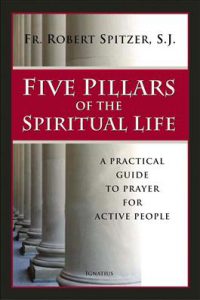A while back, I was talking to a friend about how good the people are here at St. Anthony’s, praising the fact that you love God, you’re sincere, friendly, reverent and growing spiritually. And he said, “You should tell them that!” And I said, “No!” Just kidding. His suggestion made sense to me, but I never did it because I never heard of priests praising their people and I didn’t know when or how exactly to do it.
But now’s the time. I’d like to praise God and thank all of you for your goodness, effort, good-will, your love of God, your positive response to all that we’re doing as a community, your reverence during Mass, being quiet before and after Mass in church, going to Confession more, being open to Masses that are longer (but more beautiful!), your sacrificial giving, participating in the parish retreats and formation programs.
I love the way we celebrate Mass! I’ve never enjoyed the Sunday celebration as much as I do now; I always look forward to it and that’s due in large part to you. You encourage me with your reverence, listening, kindness to each other, and trying to know each other’s names. So I want to praise God for that.
Could I ask you, “Would you consider yourself a person of praise?” If I ask your spouse or siblings, would they say you’re a person of praise? Am I? I want to be. Here’s why: St. Paul is a person of praise. He praises the Thessalonians in the Second Reading for who they are, saying, “We always give thanks to God for all of you… constantly remembering… your work of faith and labour of love and steadfastness of hope in our Lord Jesus Christ” (1 Thess 1:2-3).
St. Paul, on his second missionary journey, founded the Christian community in Thessalonica after being there only for a few weeks. But there was an uprising against him so he had to escape by night to another city and the new Christian converts were left on their own. A few months later, concerned as to how they were doing, he inquired of their situation, and, when he found out they were persevering as Christians, he wrote them a letter praising these new Christians for their faith, hope and love, even though he’s no longer with them (Ignatius Catholic Study Bible, 371). He saw the good and acknowledged it! St. Paul is a person of praise.
 Small Step #9 in this book, Marriage: Small Steps, Big Rewards, is about how couples praising each other makes for a better marriage. Over the course of a marriage, couples typically compliment each other less and less, saying, “He knows how I feel about him. I don’t need to keep saying it,” or, “She sees by my actions what I think.” When marriages are struggling, some spouses feel: “I don’t think you deserve compliments, even if they’re true” (109).
Small Step #9 in this book, Marriage: Small Steps, Big Rewards, is about how couples praising each other makes for a better marriage. Over the course of a marriage, couples typically compliment each other less and less, saying, “He knows how I feel about him. I don’t need to keep saying it,” or, “She sees by my actions what I think.” When marriages are struggling, some spouses feel: “I don’t think you deserve compliments, even if they’re true” (109).
But this is the key message I want everyone to take out of today’s homily: Praise is at the heart of good relationships. Every relationship improves when we affirm the goodness of the other person.
How many times have we talked about the importance of truth? Our faith is about truth. But not just the truth of God, the truth of our faith, the truth of the Eucharist, etc. It’s also about the truth of our family, friends and co-workers. If they have a good quality, shouldn’t we acknowledge it?
People need affirmation and compliments because they’re “powerful communicators of love” (Dr. Gary Chapman, The Five Love Languages, 37-38). E.g. “You look sharp in that suit.” “Do you ever look hot in that dress!” (Calm down. I took this from a book on marriages. Only husbands should say this to their wives, not me.) “I really like how you’re always on time to pick me up at work.” “Thanks for getting the babysitter lined up tonight. I want you to know I don’t take that for granted.” “I love how you are so responsible. I feel like I can count on you.”
What has motivated me to want to become a person of praise is the realization that the absence of praise, affirmation, and encouragement wears people down. Proverbs 18:21 says, “The tongue has the power of life and death.” In the world of business, companies where employees don’t get positive feedback suffer. In 2004, Gallup surveyed over four million employees and “concluded that employees who receive regular praise are more productive, engaged… more likely to stay with their organization… receive higher… satisfaction scores from customers, and even enjoy better health than employees who are not.”
But there’s an even more important kind of praise: Praise of God. The Responsorial Psalm today, like so many Sundays, praises God, saying, “Great is the Lord, and greatly to be praised” (Ps 96:4).
For a few months now at our parish, during different meetings and get-togethers, I’ve been encouraging people to lead prayer and do it from the heart, so that people learn to pray, grow in confidence of leading others in prayer, and not always have to rely on the priest to lead prayer. I’ve noticed people pray beautifully but many prayers never praise God. They start off with thanking Him and asking for things, but no praise.
The Psalms are Hebrew poetry, and, in Hebrew, the name for the book of Psalms is called “Book of Praises”. How many Psalms are there? 150. They’re so important that priests are obliged to pray all 150 of them every four weeks; each day, five times a day, we praise God using the Psalms.
 Do you remember when the disciples saw Jesus praying? When He finished, one disciple said, “Lord, teach us to pray, as John taught his disciples” (Lk 11:1). He said, “When you pray, say: ‘Father, hallowed be Thy name,” which means, “Father, may Your name be held holy,” or “May people recognize Your holiness.” This is praise (Cf. CCC 2807). Have we ever realized that the Our Father starts with praise? It’s only afterwards that we can ask God for our daily bread, to forgive us our sins, etc.
Do you remember when the disciples saw Jesus praying? When He finished, one disciple said, “Lord, teach us to pray, as John taught his disciples” (Lk 11:1). He said, “When you pray, say: ‘Father, hallowed be Thy name,” which means, “Father, may Your name be held holy,” or “May people recognize Your holiness.” This is praise (Cf. CCC 2807). Have we ever realized that the Our Father starts with praise? It’s only afterwards that we can ask God for our daily bread, to forgive us our sins, etc.
Isn’t it funny: Many people complain about their prayers not being heard, but how many people ask if their praise is acceptable to God (CCC 2735)? In other words, people focus on asking God for things but aren’t concerned about loving Him. What kind of a relationship is that? The catechism asks the question: What is our image of God: an instrument to be used or our Father?
But the key message today is that praise is at the heart of good relationships, including our relationship with God; not that He loves us less, but we love Him less and this distances ourselves from Him.
God doesn’t need our praise, but He does deserve it. But, like so many things in life, when we give God what He deserves, as Jesus tells us in the Gospel, “Give… to God the things that are God’s” (Mt 22:21), we get blessed! Here are nine things that Fr. Robert Spitzer says happen to us when we praise God:
- Gives us delight (since we’re focusing on the one we love).
- Puts our universe in order (when we do the most important thing, praise God, everything else falls into place).
- Brings us peace (for the same reasons above).
- Purifies our desires (again, when we do the most important things, our desires become ordered).
- Helps us see the places where we need forgiveness and light (once we focus on God, we realize what distances us from Him).
- Helps us to recognize what we have to be grateful for (the heart and mind are now in a good place, so we’re naturally more grateful).
- Allows the Beatitudes to flow freely from us (I have no idea how this one works but Fr. Spitzer wrote it).
- Transforms us in the heart of Christ (because praising God make us more like Christ).
- Makes us free to act in accordance with God’s love (Five Pillars of the Spiritual Life, 148).
So, how do we grow to become people of praise? Here are the easy steps: Pay attention to prayers of praise during Mass: the Gloria, the response after the proclamation of the Gospel (“Praise to You, Lord Jesus Christ”), the Holy, Holy, the Doxology (i.e., when the priest holds up the Body and Blood of Jesus and offers Him to the Father, saying, “Through Him, with Him, in Him…), the beginning of the Our Father, and the Our Father Doxology (“For the kingdom, the power, and the glory…”). And what’s the common prayer of praise that we all know? The Glory be to the Father, and to the Son, and to the Holy Spirit…
I’ve also asked the choirs to start singing the Responsorial Psalm at future Masses, because the Psalm is a prayer of praise. Fr. Ron Thompson told me that reciting the Responsorial Psalm is as strange as going to a birthday party and merely saying, “Happy Birthday to you, Happy Birthday to you, Happy Birthday dear Mary, Happy Birthday to you.” In our culture, it has to be sung. In the same way, the Responsorial Psalm is meant to be sung (GIRM, 61).
Here are the steps that require more effort and grace: Firstly, when we pray, start with praise. Something as simple as, “Father, I praise You because of who You are,” is good. Instead of starting with, “Lord, thank You for bringing us together,” which is good, say, “Lord, we praise You because You’re so good, so merciful, so kind, you take care of us. You’re the most perfect Father.” Make the prayer short and sweet. Praise God’s glory, beauty, etc. This week, start your prayer with praise.
Secondly, what do we admire, appreciate and like about the people in our lives? We may have to think about it for some time; “What do I admire about that person, their good points? Once we know, let’s think of a good time to tell them. It seems to me that we can do so when we greet people, when we see them do something virtuous, perhaps when we’re alone and not rushed.
Keep it positive, rather than, “You’re not as bad as you used to be.” Focus on personality, character and virtue: “You always work hard to keep yourself in shape,” or “You have such a nice way of showing an interest in people,” or “You’re willing to watch movies I like even though I know that’s not what you like’” (Guarendi, 112). And don’t overpraise or give praise that isn’t true. Our faith is about truth. If we give praise that isn’t true, it makes our words meaningless, and gives people an unrealistic sense of their good points, abilities and character.
This is our homework, because next week, the homily will be on what’s holding us back from becoming people praise: shyness, pride, not being used to it, feeling uncomfortable? Try it this week and, if you’d, like, please give me feedback.
Again, Proverbs says, “The tongue has the power of life and death.” We expect priests to build us up with encouragement and praise. So let me remind you: You people are wonderful and you’re doing many things well. You’re doing a great job. But we also expect Christians to build up other people. Could you imagine how amazing it would be to guarantee that we could come to Mass and someone would give us an encouraging word, something affirming? That’s what Jesus is calling us to: To have a culture of praise. People deserve it. Praise is at the heart of good relationships.